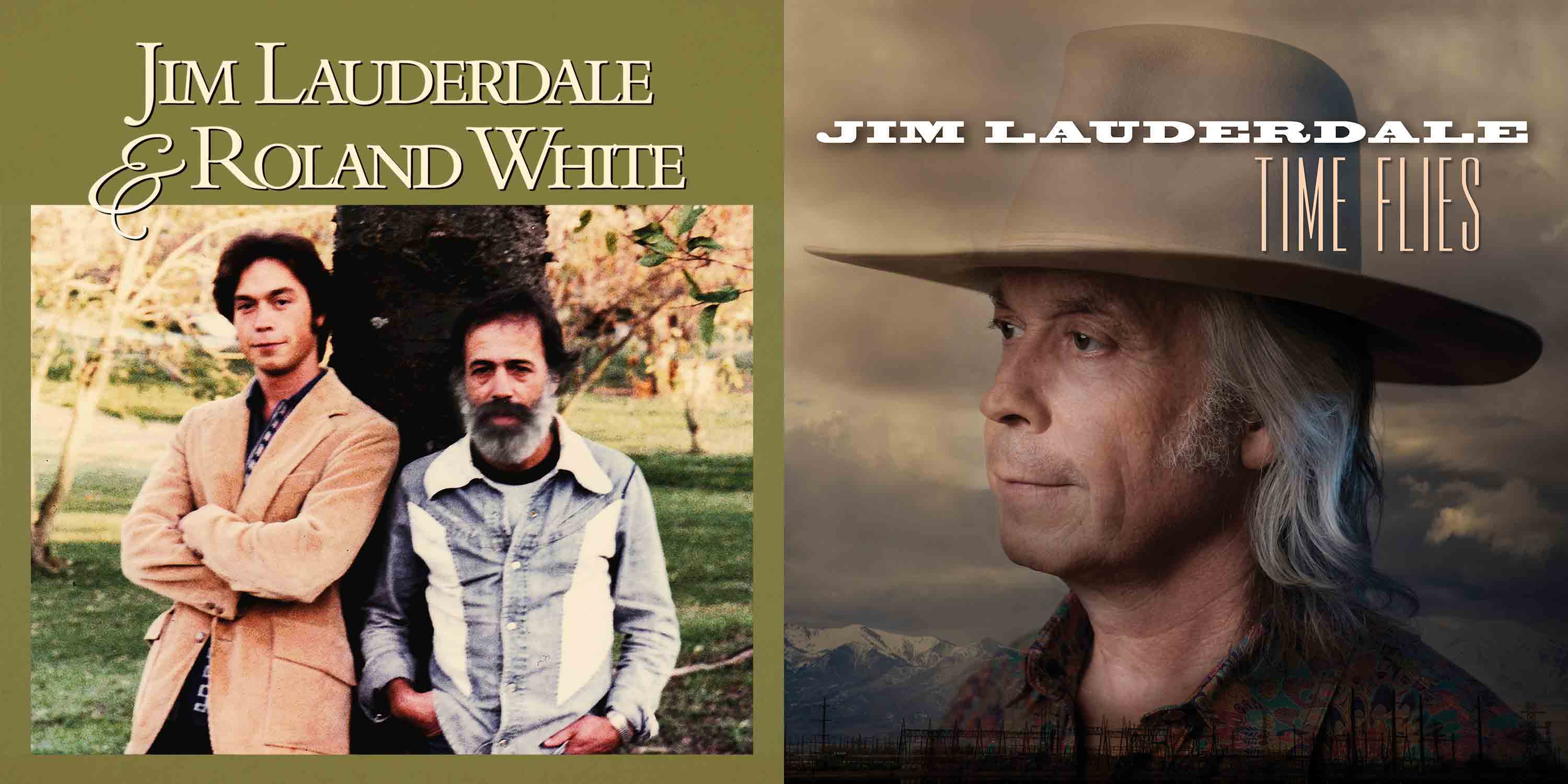 Award-winning singer-songwriter Jim Lauderdale talks about his upcoming album, Time Flies, and his long-lost first recordings, Roland White.
Award-winning singer-songwriter Jim Lauderdale talks about his upcoming album, Time Flies, and his long-lost first recordings, Roland White.
Known for writing and co-writing many hit tunes for iconic artists like George Strait, Patty Loveless, and Mark Chesnutt, Jim Lauderdale is one of the most respected Americana artists around and a sought-after fixture in Nashville.
Now, after decades in the business, he bookends his long career thus far with the simultaneous release on August 3 of two new albums, Time Flies and his previously unreleased first album recordings, Roland White.
Born in Troutman, North Carolina, Lauderdale grew up in Due West, South Carolina, the son of parents who both sang. Before forging his now-thriving career in Music City, he went to college, played in country and bluegrass bands, and tried his luck in both New York City and Los Angeles, eventually relocating permanently to Nashville and bunking with friend and fellow musician Buddy Miller till he could find his own place.
Recorded in 1979 in the basement of Earl and Louise Scruggs’ Nashville home and lost for decades until recently, Roland White unearths the earliest bluegrass core of Lauderdale’s sound, while Time Flies showcases the signature Americana country sounds that fans know and love.
The albums are Lauderdale’s 30th and 31st. Together they span a career that’s produced countless chart-toppers, two Grammy Awards, and a Wagon Master Lifetime Achievement Award.
When we recently caught up with Lauderdale to talk about his upcoming releases, he reflected on the struggles and achievements of decades of music-making.
Cowboys & Indians: You’ve got two new albums coming out in early August. What do you hope fans will take away from Time Flies and Roland White?
Jim Lauderdale: The Roland White record — since it was going to be my first album release, but [the recordings] got lost — it kind of shows where I was at the time, musically. And then Time Flies brings me back to present date and where I’m at now musically. … It kind of shows this progression through those years, these two albums. It means a lot to me that the Roland White recordings were found. I was really disappointed when I couldn’t get a deal for it at the time, so I kind of just didn’t pursue the bluegrass world, which I had grown up in and had aspired to be part of, and then I followed country more.
My goal was to get a record deal and it took several more years for that to happen. In the meantime, though, I wrote a lot. I really developed my writing skills and did a lot of demo tapes to try to get a record deal. Through these years, my music kind of [developed into] what they call “Americana” music now. Also I’ve embraced the traditional country and progressive country and soul music and blues and rock. So Time Flies shows that in a way, I think.
C&I: What was the writing and recording process on Time Flies, and do you remember the process for Roland White?
Lauderdale: Oh, yes. The recording process for Time Flies and the writing process: I was given the opportunity to have a good deal on some studio time at a place called Blackbird Studios in Nashville. They have a school there called The Blackbird Academy, and so students are training while clients are recording, and it’s much cheaper than doing it at the regular studio. So that was appealing to me because on one hand, I got to work with a lot of aspiring engineers. The standards and quality were still there. That was kind of neat just to observe, to be part of that process, and it allowed me to go to Blackbird and record a lot of songs. Then after I had already recorded about 12, 14, or so songs, some of my band wasn’t available, and so I brought in Chris Scruggs and Kenny Vaughan, who play with Marty Stuart, who incidentally — Marty is also playing acoustic guitar on my latest record.
I’m a big fan of Marty Stuart’s. I really love him and respect him. My sound kind of changed, having those two new guys in there and also a different keyboard player and different drummer, because these other folks weren’t available. So I got a different sound and I began writing after we recorded several, knowing that this different sound was taking shape. I was inspired to come up with some new things. ... That was helpful in my process. It gave me a shot in the arm and a different interesting twist on things.
Also during this time, I brought in Lillie Mae Rische and her brother Frank Rische to sing harmonies. They really added so much to the sound. They really completed things and took it to a different place. And so all these ingredients made this, to me, a very different record than I’ve ever done. So I’m just real happy that that happened. ...

C&I: Throughout your career, you’ve explored so many different sounds, from bluegrass to country to Americana. What were some inspirations for the sound on Time Flies?
Lauderdale: I’d have to really say it was those musicians that I worked with from the beginning to the end of the process. I write a lot in the studio or the night before, the morning of, or during a meal break — at least the melodies. And sometimes I’ll have a title or a line in a song, so it helps me to kind of have this pressure situation, even though it’s nerve-wracking, to have a deadline, even though it’s a self-imposed deadline. When you have the studio time booked and the musicians booked, you have to deliver, and so that’s the pressure. It’s like, “Hey, I’ve got to come up with something that’s worthy and good enough to be part of a record.”
C&I: How do you think these two albums reveal how you’ve evolved as an artist?
Lauderdale: It’s been an interesting journey. I’ve kind of evolved with my expectations and hopes and dreams and disappointments and the good and the bad. At times, it’s been a struggle for me with the business part of things, just because nothing ever happened easily for me, as far as successes. Everything was really hard to achieve. Partly just because of the nature of the music business and things with the commercial country world, which I did several albums for.
I never had luck and success on my own with radio, but the good thing was that other artists started hearing my songs from these records and started recording them — the main one being George Strait, who recorded “King of Broken Hearts” and “Where the Sidewalk Ends” for his Pure Country soundtrack. And that gave me acceptance as a writer in Nashville. [I’ve written for] people like Patty Loveless and Kathy Mattea, the Dixie Chicks, and Gary Allen. People started recording my songs and gave me a chance to make a living and keep pursuing my recording aspirations. I think my favorite thing, or one of my favorite things — I also really enjoy playing live — is the process of making an album.
I think, as I get older and have more records under my belt, I just kind of slowly learned how to keep in there, to hang in there and continue with what I’m doing, no matter how challenging it might be.
C&I: How do you normally go about a song? You mentioned that you pick up melodies between recording times. Do you normally start with your lyrics first or the melody?
Lauderdale: It’s both, but sometimes it’s simultaneous when I get a song title and a melody at the same time. But sometimes it’s just the melodies. … That process just happens all the time. Not every day but many days a week, a melody will just come to me and I’ll put it down. I also schedule co-writing appointments as well, and songs get finished way in advance [during that process]. For instance, there’s three co-writes on this record: one with Odie Blackmon called “Where the Cars Go by Fast”; Pete Bernard from a group called The Devil Makes Three — we wrote a song called “When I Held Tre Cards in my Hand”; then I wrote about five songs with a writer named Mando Saenz, who is originally from Texas but now lives in Nashville. ... We co-wrote “Time Flies” together.
Odie Blackmon and I wrote a song several years ago called “Two More Wishes,” and I just found out the other day that George Strait recorded that on his upcoming album, so I’m real excited about that. He’s recorded more songs than any other artist of mine. That will bring it up to 15, so I’m just really grateful to him and all of these other artists that have recorded my songs because, like I say, it allows me to survive and to keep going and to keep following my dream of just continuing to make records and to just keep very slowly building my career.
C&I: Is there a difference between writing for yourself and writing for someone else?
Lauderdale: The approach is different. When I’m writing for myself, I don’t have anybody else in mind to record it, other than just me, and I just hope the song is good enough for somebody to hear it and think, Hey, I need to record that. And when I write for other people, I do have their style and their voice in mind.
C&I: Has there been a song in your career that you’ve been proudest of?
Lauderdale: I think the song “King of Broken Hearts” that George Strait first recorded. That’s a song I still do live just about every gig. That was really significant to me and a big break for me. Also a song that Patty Loveless recorded as a duet with George Jones called “You Don’t Seem to Miss Me” really meant a lot, too, because I was such a big fan of theirs and they did such a good job on it. So those are two I can think of right off the bat.
C&I: Any fun stories along the way of getting Time Flies from concept to actual release?
Lauderdale: I can’t think of a specific thing. I always have a good time in the studio with the musicians. I joke around a lot and try to get a few laughs out of people along the way, so it’s a fun process for me even though sometimes I’m nervous and stressed-out and feeling the pressure of doing it at times. It’s usually fun for me in the studio, and musicians are a great bunch of people to spend time with and hang out with. There’s kind of a camaraderie and friendship there and a bond that develops as you’re creating music and bouncing ideas back and forth and hearing the result.
C&I: What’s something that fans might not know about you?
Lauderdale: That my hobby is tai chi and internal martial arts.
For more information on Jim Lauderdale, including upcoming tour dates and how to preorder Time Flies and Roland White, visit his website. Photography: Courtesy Big Hassle Media.
More Q&As
The One and Only Charlie Daniels
Rocker Jason Charles Miller
Drew Holcomb and Johnnyswim














